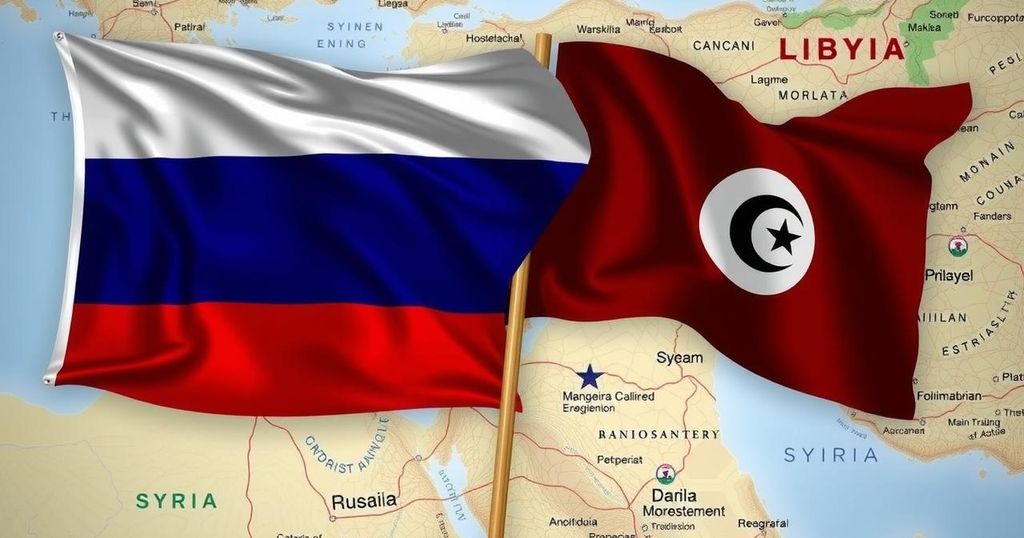Russia’s Potential Military Shift to Libya: Implications and Strategic Interests

Analysts are considering the implications of Russia potentially shifting its military focus from Syria to Libya following shifts in control within Syria. The loss of military bases in Syria may compel Russia to solidify its presence in Libya, where it already operates. This move could have significant ramifications for Libya’s internal power struggles and international diplomatic efforts, particularly regarding Khalifa Haftar’s influence.
The potential for Russia to redeploy its military assets to Libya after its involvement in Syria is a subject of significant speculation among analysts. While the consensus is that losing ground in Syria may not materially impact Russia, it is crucial for Moscow to maintain a strategic presence across the Mediterranean and Africa, a footprint that has been cultivated over the past decade. During the Syrian conflict, Russia bolstered its military and diplomatic support for Bashar al-Assad, enabling it to establish crucial military bases in the region, namely Khmeimim airbase and the naval facility at Tartous.
However, with Assad’s regime now facing the possibility of collapsing into the control of Hayat Tahrir al-Sham (HTS), the future of these bases appears increasingly precarious, prompting discussions about alternative sites such as Libya. Analysts note that the aforementioned bases are essential links in Russia’s influence extending from Moscow to Africa and the Mediterranean, making their potential loss a pressing concern. Libya stands out as the only viable alternative for Russia, given its existing military presence and the strategic geographical advantages it offers, such as a foothold in North Africa and proximity to Europe.
Nonetheless, the implications of a heightened Russian military presence in Libya could significantly destabilize the already volatile region. Libya has been embroiled in a power struggle since the 2011 revolution, featuring factions led by the Government of National Accord in the west and Khalifa Haftar’s forces in the east, creating a fragmented landscape. Any significant increase in Russian military involvement could bolster Haftar’s stance, impacting negotiations about Libya’s political future.
As policymakers across the West gauge their options, analysts express concern that Haftar, with increased support from Russia, could undermine negotiations facilitated by the UN, further complicating the already intricate landscape. This geopolitical maneuvering illustrates the intricate dynamics at play in Libya and the broader implications of potential Russian military expansion into the region. Russia’s presence in Libya is not merely a military strategy but also a means to exert influence over critical European migration routes and trade corridors, showcasing the multi-faceted nature of this geopolitical chess game.
The topic of Russia’s potential military redeployment to Libya arises amidst discussions regarding the strategic implications of its reduced presence in Syria. Analysts assert that Russia has cultivated an influential position across the Mediterranean and into Africa over the last decade, primarily through military engagements supporting the Assad regime. With changes in Syria’s control dynamics, there is increased scrutiny of how Russia will adapt its strategy in the face of potential losses in the region, particularly by exploring alternative footholds in Libya, which presents unique strategic advantages.
In summary, the prospect of Russia enhancing its military presence in Libya is fraught with implications for regional stability and geopolitical tensions. While the loss of bases in Syria may not critically undermine Russia, the strategic need to retain influence in Libya cannot be overstated. By potentially backing Khalifa Haftar, Russia could reshape the power dynamics within Libya, complicating international diplomatic efforts aimed at stabilizing the region amidst ongoing conflicts. Such developments underscore the necessity for Western powers to remain vigilant in their approach to both Russian maneuvers and Libyan political dynamics.
Original Source: www.aljazeera.com







